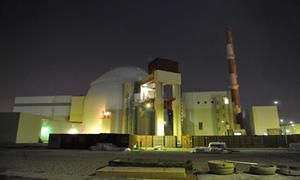Iran's bombIn a setback, Iran unloads nuclear fuel from Busheher reactor
Iran announced Saturday it was unloading nuclear fuel from the Bushehr reactor, signaling more problems for the Russian-built plant after decades of delay; a source close to the project said the fuel was being unloaded on the suspicion that metal particles from nearly 30-year old equipment used in the construction of reactor core had contaminated the fuel; a senior Iranian official said earlier this month that suggestions should be investigated that the Stuxnet computer worm, believed to have been an attempt by Iran’s enemies to sabotage the nuclear program, had caused harm to the 1,000 megawatt Bushehr reactor

Iran's Bushehr reactor // Source: veteranstoday.com
Iran confirmed on Saturday it was having to remove nuclear fuel from the reactor of its only nuclear power station, signaling more problems for the Russian-built Bushehr plant after decades of delay.
Iran’s nuclear envoy Ali Asghar Soltanieh told the ISNA news agency Russian engineers who built the plant on Iran’s Gulf coast had advised that the fuel be unloaded for tests. The plant’s head said it was being removed for safety reasons. “Based on Russia’s request to run tests and technical measures, the fuel will be unloaded from the core of the reactor and will be returned to it after completion of the tests,” Soltanieh said.
The Baltimore Sun reports that a source close to the project said the fuel was being unloaded on the suspicion that metal particles from nearly 30-year old equipment used in the construction of reactor core had contaminated the fuel.
“We’re talking about particles of about 3 millimeters in size,” said the source speaking on the condition of anonymity.
“Some of the equipment used in the construction has been sitting around for 30 years. The fuel has to be unloaded and examined to make sure no metal particles have gotten into it.”
The fuel could take six days to unload, he said.
The International Atomic Energy Agency (IAEA), which mentioned the fuel problem in a confidential report seen by Reuters on Friday, would supervise the unloading procedure, Soltanieh said.
A senior Iranian official said earlier this month that suggestions should be investigated that the Stuxnet computer worm, believed to have been an attempt by Iran’s enemies to sabotage the nuclear program, had caused harm to the 1,000 megawatt Bushehr reactor.
That was after Russia’s NATO ambassador said the computer virus could have triggered a nuclear disaster on the scale of the 1986 nuclear accident at Chernobyl in Ukraine, then part of the Soviet Union.
“Safety is paramount and has the priority over speed for the start-up of this power plant,” Bushehr’s manager, Hossein Derakhshandeh, told the official IRNA news agency.
“All is being done solely with the goal of making final checks,” he told the semi-official Mehr news agency.
Bushehr was started by Germany’s Siemens in the 1970s, before Iran’s Islamic revolution and has been dogged by delays. Fuel was loaded into the reactor four months ago but a January deadline for it to start producing electricity was missed.
Further delays could be an embarrassment not only to Iranian politicians who have made Bushehr the showpiece of Tehran’s peaceful nuclear ambitions, but also for Russia which would like to export more of its nuclear know-how to emerging economies.
Hamid-Reza Katouzian, head of Iran’s parliament’s energy committee, blamed Russia for the delays. “The Russians’ repeated breach of promise and irresponsibility in the Bushehr project continue unabated,” he told Sharq daily.
“Although Iran has spent one and half times more than it should have on the Bushehr power plant, there is still no news of the commissioning of the plant and its power generation.”
Iran is under international sanctions due to fears its nuclear program is aimed at making atomic weapons, something it denies.
Experts say that firing up the $1-billion Bushehr plant will not take Iran any closer to building a nuclear bomb since Russia will supply the enriched uranium for the reactor and take away spent fuel that could be used to make weapons-grade plutonium.
